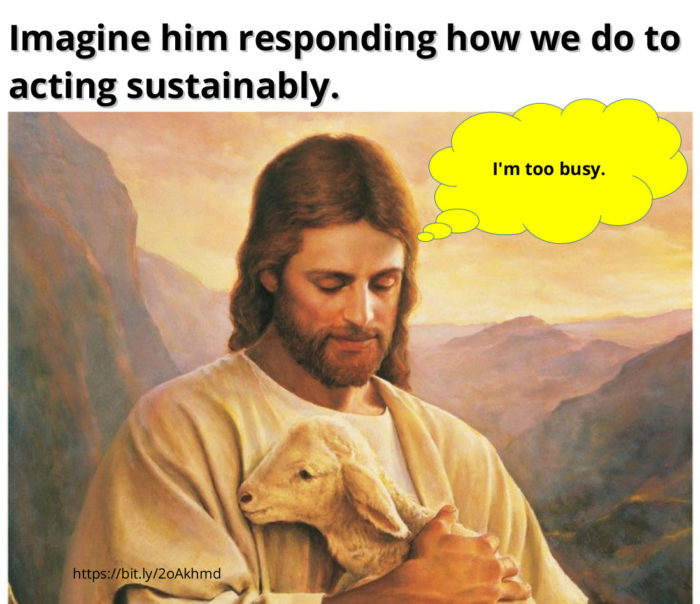Mark 12:31: “The second command is equally important: ‘Love your neighbor as yourself.’ No other commandment is greater than these.”
Would you drive a car that sent its exhaust into where you sit? Would you fly in a plane that sent its exhaust into the cabin? Would you dispose of all your garbage by digging a hole in your yard and keeping it there forever?
If you send the exhaust and garbage into the rest of the world, it doesn’t go away. You’ve made your problem your neighbors’ problem.
If you were in a situation, like camping or hiking, where you only had enough water to last you the trip, would you squander and waste it?
Polluting and depleting favor yourself over your neighbors. Since I define leadership as helping people do what they already wanted to but haven’t figured out how, in my sustainability leadership practice, I avoid telling people what to do. I try to help them do what they want.
But let’s say you valued the advice of someone and that person gave you commands, including:
The second command is equally important: ‘Love your neighbor as yourself.’ No other commandment is greater than these.
You might choose to follow it. It would mean not polluting or depleting. Humans lived for 250,000 years without polluting or depleting, living at least as healthy, safe, and secure as us today, living as long lifetimes. As I often say, “living sustainably isn’t hard. Living sustainably in a culture that, for whatever lip service it pays to sustainability, values and promote living unsustainably is hard. That’s not a problem of technology, innovation, market incentives, or laws. That’s a social and cultural problem.”
If you believe living sustainably means burden, deprivation, and sacrifice, you might think loving your neighbor as yourself means burden, deprivation, and sacrifice. Since effectively everyone outside a few indigenous cultures pollutes and depletes, everyone is violating the commandment to love your neighbor as yourself. It’s too hard, too inconvenient.
By lowering my environmental impact over 95 percent, striving to reduce it more, while also leaving it better than I found it to the extent I can and influencing others to, I am loving my neighbors as myself more than anyone I know.
The bottom line on loving your neighbor as yourself
I can’t command you to love your neighbor as yourself, but can tell you it makes for a better life, despite what our culture implies.
I can’t speak to afterlives, but if you believe violating commandments affects your afterlife, you may want to consider loving your neighbors as yourself more, maybe by stopping polluting and depleting as much as you can.
For more images like the one below, read Imagine well-known people responding how we do to the environment.

Read my weekly newsletter

On initiative, leadership, the environment, and burpees